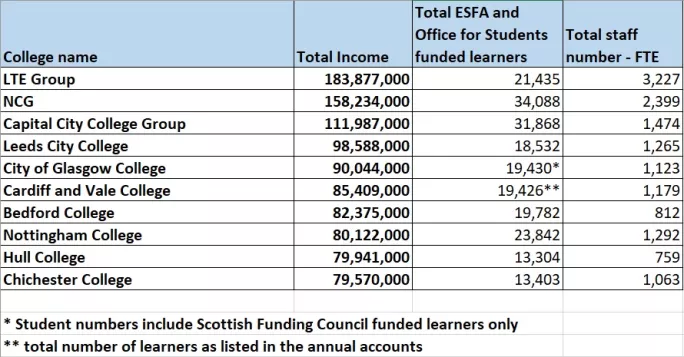- Home
- Revealed: The biggest college groups in the UK
Revealed: The biggest college groups in the UK

The largest 10 college groups in the UK had a combined income of over £1 billion in 2017-18, Tes analysis has shown. This reveals the significant growth of groups as a result of merger, particularly in England, since 2015-16.
Two years ago, similar analysis showed a total income of the top 10 colleges of £869.1 million, with a range from £187.3 million for LTE Group to £59.6 million for Belfast Metropolitan College.
Now, LTE Group remains at the top with £183.9 million, while in 10th place, Chichester College had a total income of £79.6 million, according to its 2017-18 accounts. The growth of college groups in England, due to merger, has also led to only two colleges from elsewhere in the UK making the top 10 – City of Glasgow College in fifth place, followed by Cardiff and Vale College in sixth. Two years ago, four colleges outside England were in the list.
Background: College incorporation is 'an experiment that has failed'
Opinion: 6 secrets to being a great college leader
More on this: 'College merger mania has failed. We need a new model'
Formed through merger
Both City of Glasgow and Cardiff and Vale colleges were formed through merger as part of government reform of the Scottish and Welsh FE systems, prior to the area review process in England and its subsequent wave of mergers.

This year’s top 10 sees LTE and NCG remain at the top, followed by Capital City College Group and Leeds City College. Bedford College, Nottingham College, Hull College and Chichester College make up the remained of the top 10 – and all of them have been through merger in the past few years.
Julian Gravatt, deputy chief executive of the Association of Colleges, said the increase in total income among the largest colleges in England was indeed “entirely down to merger”. He added: “The main reason why income would have gone up would be if funding increased, but we know that it has in fact gone down. Colleges would always get about 80 per cent of their income from the government, and other income streams are pretty limited. The total income of the sector has gone down in recent years. So this will be entirely down to merger.”
Mr Gravatt pointed out that there were academy trusts and universities with significantly bigger total incomes than the college groups at the top of the table. He therefore had no concerns over their size, as long as they were well funded and well managed.
Ian Pretty, chief executive of the Collab Group of colleges, which represents large colleges across the UK, among them a number of institutions in the top 10, said their size offered economies of scale. “It is about how you remain sustainable," he added. "The question is how sustainable is a college in future that is below £20 million in income. Can it be sustainable over time?” Mr Pretty said colleges could grow too big if senior leaders did not have the skills required to run businesses of that size.
John Thornhill, chief executive of LTE Group, said the small drop in income shown in LTE’s accounts was “a planned strategy”. He added: “Our focus going forward is around growing our cash generation and surplus. So, if you have a look at our accounts in that year, and the ones we’ve got submitted that will be published in the next few months, you’ll see a slight reduction in income and turnover and a growth in cash. The reason for that is we are making significant investment in new facilities, and by generating more surplus and more cash it means we generate less money from the banks.”
Diversification of income
Mr Thornhill explained: “We wouldn’t class ourselves as a college group – that’s really important. If you look at other organisations around the UK, generally they are groups that are formed of several different colleges and we are not. We have only one college and the college proportion of our overall turnover is less than a third. We’ve got six different organisations that all deliver education and skills in some form or another, but the vast majority of it is commercially tendered and commercially won.
“Because our income is diversified in six or seven different parts of the skills sector, if there’s change in government policy in any one year, it means we are insulated from it. If you’ve got a group just made up of purely FE colleges, there is always a risk that if there’s any change to the funding of FE organisations, then a group that’s got all FE colleges could be impacted several times over.”
Mr Thornhill explained that there were significant benefits to being in a large group: “There are lots of advantages in terms of if you want to borrow money or raise finance, or if you want to do things and invest in things, you’ve got the resources and the investment to do so. I think some of the challenges are you can’t do anything at once. If we wanted to make an investment in one part of the group, we can’t do everything in the same year.”
Serving communities
Liz Bromley, chief executive of NCG, said the college group had refreshed its strategy and had determined that our mission is to enable social mobility and economic prosperity through outstanding education. She said this meant the group had to have colleges within it catering for areas that were geographically more remote or that were based in less well-off areas. Small, standalone colleges in such regions were increasingly harder to sustain financially, she pointed out. “But as part of NCG, they are able to fulfil a vital mission, having a real impact on the lives of local people and contributing to the local economy.”
Roy Gardner, vice-principal at City of Glasgow College, said: "Our investment in our people, our estate and our equipment underpins an expansion in commercial activity that is at the root of our growth over the recent period, with employers both at home at abroad attracted by our world-class, industry-facing facilities.”
He added: “The scale we have achieved gives us the resilience and capacity to compete effectively in competitive domestic and international markets. But throughout this period of growth, we have not once lost our focus on our learners and our business partners. Scale is important, and gives us the flexibility and agility necessary to thrive in the competitive environment in which we operate. But it is our culture of learner and employer focus that is the bedrock of our success."
Rachael White, Capital City College Group’s finance director, said the increase in the group’s income from 2015-16 to 2017-18 could be explained by the merger of the Capital City College Group (which comprised City and Islington and Westminster Kingsway Colleges) with a third college – the College of Haringey, Enfield and North East London (CONEL) in November 2017.
“Between our three colleges, the Capital City College Group has 11 principal sites currently teaching over 28,000 learners of all ages, in a very wide range of subjects and levels, from entry-level through to higher education courses. Our size enables us to reach out to more students across the boroughs where we work, collaborate with more employer partners, teach more subjects, and ultimately help more people gain the skills that they need to achieve their dreams.
“London is arguably one of the most dynamic cities in the world and we are in a privileged position to be the capital’s largest FE provider. Our focus is on London and so we can concentrate our resources and expertise better, to transform the life chances of thousands of people every year.”
The 10 largest colleges in the UK

Keep reading for just £1 per month
You've reached your limit of free articles this month. Subscribe for £1 per month for three months and get:
- Unlimited access to all Tes magazine content
- Exclusive subscriber-only stories
- Award-winning email newsletters



